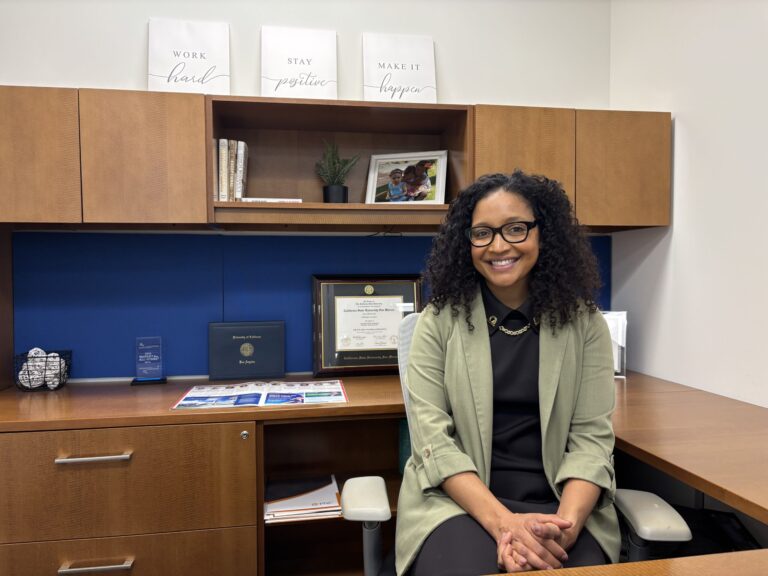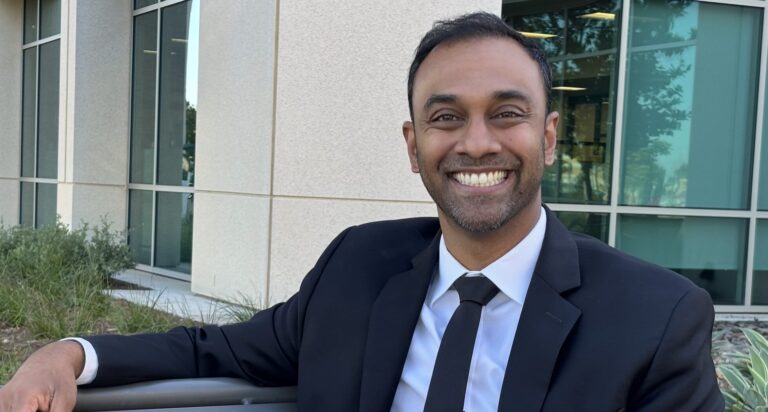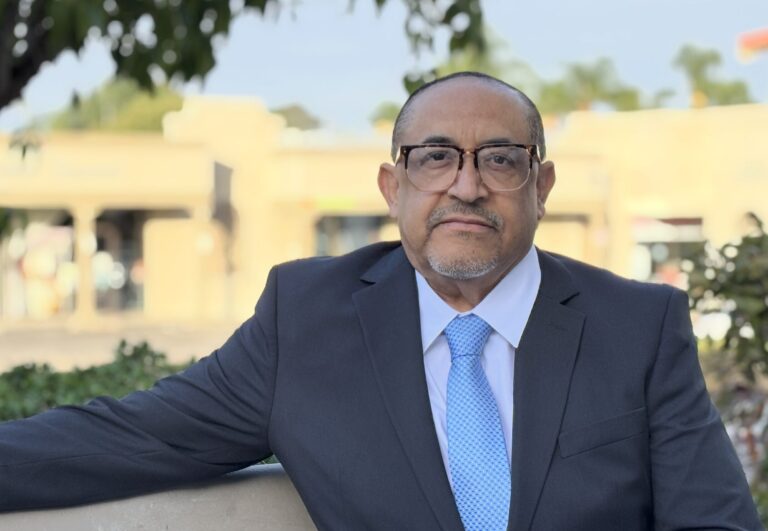From food and health insecure to Executive Director at UC San Diego Center for Community Health
By Melanie Slone
Blanca Meléndrez says the food insecurity and health disparities she and her family experienced marked her life journey. “My parents were low-income. We had to rely on food assistance programs. We did not know how to navigate the system for access to education.”
Today, Blanca is the executive director for the UC San Diego Center for Community Health, housed under the Altman Clinical and Translational Research Institute.
“My commitment to this field of community-engaged public health has been rooted in my personal background, my lived experience, and my passion to drive change, to address health disparities, and to advocate for health equity in our communities,” says Blanca.
Underserved communities have little access to health education to understand healthcare processes. “I personally witnessed that when I came to this country and I didn’t speak English well, and my dad had cancer.”
Lived Experience
Born and raised in central Mexico, Blanca came to the US as a minor, when she “witnessed firsthand the challenges and inequities that are prevalent in healthcare systems and the impact of social determinants on accessing health services in underserved communities.”
She completed high school in an ESL program. “My parents had their dreams of us having the opportunity to go to college,” but “I didn’t get to speak the language,” she says.
“I remember recording my classes and then translating almost word for word because I didn’t understand a word of what was being said. I met the requirements, but I was not academically ready to be in a university,” she remembers.
A first-generation student, Blanca transferred from Southwestern College to UC San Diego, where she studied political science and literature. Living in Tijuana, she spent a couple of hours crossing the border every day. “Affirmative action and other special programs for transfer students is what really allowed me that opportunity for higher education,” she says.
Today, Blanca is a public health practitioner as the executive director of the center, which she says plays a unique role “advocating for social justice health equity in communities of color for almost three decades now.” The center drives community-based public health initiatives to improve health outcomes and achieve equity for immigrants, refugees, and underserved populations.
“Our goal is to ensure health justice in our communities that historically face these disparities and help grant access in outcomes, an opportunity to live a healthy life with dignity” Blanca says.
“The center is rooted in a commitment to allyship, to trust building, and cocreating solutions that prioritize community lived experiences to advance health equity through community partnerships by transforming public health practice, research, and education,” she explains. “Across core focus areas of our work is nutrition security, food equity, child and family health, and refugee and immigrant health.”
Blanca seeks to discover what resources are needed to live a healthy life. “Part of my job is addressing systemic racism and social justice. That means that we need to address the root causes of health disparities—poverty, discrimination, lack of access to healthcare, lack of access to food.”

Barriers to Healthy Lifestyles
Blanca says there has historically been a lack of equitable investment in certain communities. “There are an insufficient number of healthcare providers with cultural competency to serve our diverse communities effectively.”
She notes that health information in languages other than English is often delayed or limited. “Our communities from immigrant and refugee backgrounds, non-English-speaking populations, they struggle to navigate our health system. And they face discrimination leading to not having culturally competent care.”
Another issue underserved communities face is a lack of access to affordable housing and to job training and employment opportunities that provide a livable wage.
Low-income communities lack “the financial means to afford healthcare, nutritious food, and all that impacts their health, their health conditions that are preventable.” Chronic diseases such as diabetes, heart disease, cardiovascular problems, hypertension, and lung disease result from these issues and others, including exposure to pollutants, unsafe living conditions, and a lack of greenspace for physical activity. “These illnesses are responsible for 50% of the deaths in our country,” she says, and they are preventable.
Working Directly with the Community
The center has been advocating for social justice and health equity in communities of color since the late 1990s, which has allowed them to build trust in the community.
“We are considered a trusted partner with deep community connections,” says Blanca. The center has partnerships with hundreds of organizations, but its biggest plus is that it is embedded in the communities served.
To solve the issues, she says, they take an asset-based approach, which means not focusing on what is wrong with the community but rather talking to the community to find out what they need. “We recognized community as experts, as researchers, as part of the framework that we use.”
She works with the ideas and experiences of the people served to come up with solutions together. “The community-led transformation model centers the knowledge and priorities of people who are most impacted by health inequities to collaborate with us as an academic institution, to cocreate new solutions to systemic disparities.”
Blanca and Amina Sheik Mohamed were recently recognized with the James Irvine Foundation Award for the work the center does with refugee and immigrant communities, “reimagining how public health initiatives, research, and programs are implemented by placing our communities, those that are impacted, at the center of the decision making,” says Blanca.
Programs
Since the pandemic, the center has collected some 8000 stories through the platform Street Wise, where community members enter their lived experience about “what works well in their neighborhood, what doesn’t, and what needs improvement.”
This engagement helped them identify the top priority needs, including:
- Housing to live with dignity.
- Food justice, equitable access to land and healthy, fresh, culturally appropriate food and water.
- Health justice to eliminate health disparities through equitable and fair distribution of benefits.
- Neighborhood justice to address discriminatory practices rooted in racism that perpetuate inequities.
- Reliable, multi-model transportation to healthcare facilities.
- Maintenance of schools, parks, libraries, safety, and sanitation.
Just a few of the programs Blanca and the center lead or work with include:
- The 3-4-50 program on behaviors that contribute to chronic diseases
- Expansion of the San Diego Childhood Obesity Initiative
- ¡Más Fresco! Program and California Fruit and Vegetable EBT Pilot Project
- Mother’s Nutrition Center Program through WIC
- Prescription program with partner clinics like Alliance Healthcare, VCC, Family Health Centers of San Diego
- Support for programs for refugees
- And others
The projects include ethnic-led CEOs who work together to address priorities that come directly from community members. Blanca says there are some “400 partners working in 7 different sectors to advance healthy eating and active living through policy systems and environmental changes.”
Funding comes from grants in response to needs noted by community members with lived experience, UC San Diego School of Public Health, and partners. The center also carries out research on food justice and responses. “One of the goals of the university-based center is to make academic-institution research more relevant to communities and build trust with them,” says Blanca. “It’s not just research.”
She is grateful for her team. “This is a team effort. I have a phenomenal team of public health practitioners. We’re almost 80% woman-led, many minority women, first-generation, with lived experience…and we do this work because we collaborate with the community. They are our experts and partners in this work.”
Latinos at UCSD
Blanca partners with the UC San Diego Office of Equity, Diversity, and Inclusion on a campaign to encourage Latino students to go to UC San Diego and is part of a collaborative effort to make UCSD into a Hispanic-serving Institution (HSI).
“We’ve spent many years with media campaigns and outreach activities to educate our families and our youth so that they can see that they have a house at UCSD that is waiting for them with open arms to support them.” Read about it: https://miuniversidad.ucsd.edu/en/index.html
“We also have a program with UCSD Extension. Our parents and our youth can take classes on UCSD Extension at no cost, and they get college credit,” Blanca adds.
Her hope is that others can change their lives as she did, thanks to the people who supported her at UCSD. “Deep in my heart is that sense of, I went through all of this, and I hope everybody can have access to a better life and hope in the future. That’s my personal and professional passion. And I get to do that in my job, a job that I love.”




